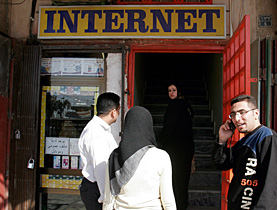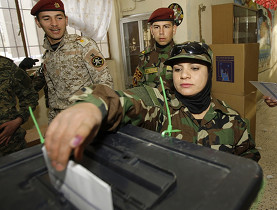Online therapy gives hope to Iraqi victims

A project developed by Swiss and German researchers offering internet psychotherapy to victims of violence and trauma in Iraq is recording its first successes.
Around 250 people have already contacted the InterapyAid treatment programme which Zurich University scientist Birgit Wagner helped create in 2008.
Although life has improved in Iraq, the country remains volatile. Only last Friday a female suicide bomber killed 32 pilgrims in a city south of the capital, Baghdad. For many people, violence forms a backdrop to their everyday life.
Around 50 per cent of the population suffer trauma as a result, according to the Swiss Refugee Council. But many healthcare professionals have left the country.
“There is an enormous demand for psychotherapy, but not enough treatment is offered,” Wagner, a research assistant at the university’s department of psychopathology, told swissinfo.
Along with a colleague from the Centre for Torture Victims in Berlin, Wagner has developed a programme that offers an “internet bridge” to victims.
Studies in Europe have shown that internet-based therapy (Interapy), which involves writing down traumatic experiences under the guidance of a specially trained therapist, can have positive results.
Anonymous setting
“For people who have suffered sexual abuse or have been raped, often highly stigmatised trauma, it seems helpful to open up and write down their experiences in an anonymous setting,” Wagner said.
“Another advantage of internet-based therapy is that people can access it from anywhere and don’t have to go to a treatment centre or therapist.”
To be accepted people have to go through a screening process, as not everyone is suitable. Automatically excluded are those with schizophrenia or other severe disorders and people with suicidal tendencies.
The treatment, which is in Arabic, follows in three stages. A patient is expected to participate twice a week and can write from the comfort of their home computer. Contact takes place by e-mail.
In the first stage, “self-confrontation”, the victim writes four texts about his or her most emotionally painful memories.
“They are asked to write it in the first person and in the present tense, so it’s very close to them. They are things like what happened? What was the smell? Who was with you?” explained Wagner.
Confronting a memory
In texts three and four, the patient deals with most difficult part of the memory.
“Most events have a moment which is really so bad that people avoid thinking or writing about it, which can give them uncontrolled intrusions about the traumatic event, such as nightmares or intrusive thoughts,” said Wagner.
The second part, “cognitive restructuring”, encourages patients to use their experiences to give advice to another, fictional, victim of the same ordeal. This gives them another perspective.
In “parting”, the final stage, patients write a letter, which may or may not be sent to someone close to them, which allows them to close with the trauma of the past.
“We have lots of cases of people who have been victims of kidnapping or who have seen their husband, wife or father kidnapped. Other cases involve witnessing some bombing or losing someone close to them through bombing,” said Wagner.
Good results
Around 15 people have finished the therapy so far, and have improved their symptoms significantly, says Wagner. In the European studies, more than 80 per cent of those treated were free of complaints afterwards.
A full assessment of the Iraq results will take place when the project closes in 2010.
Wagner and her colleagues are in the meantime pleased with the project’s uptake, especially as psychiatric issues remain more stigmatised in the Arab world.
But the therapy takes longer than the usual allotted five weeks, because people do not always have internet access or safe surroundings. Making contact with those who have fallen behind with the therapy can also be problematic, adds Wagner.
Nevertheless, the psychologist could see projects like InterapyAid forming part of humanitarian work.
“I’m not sure if this specific programme will also be done in somewhere like Rwanda, but conflict countries and the developing world have more and more access to internet, so it is definitely where the future lies,” said Wagner.
swissinfo, Isobel Leybold-Johnson in Zurich
Trauma describes a variety of psychological and physical complaints following an event such as witnessing or being a victim of violence, war experiences, the death of a loved one or traffic accidents.
The symptoms are categorised as “Post-Traumatic Stress Disorder” (PTSD) and include: intrusions such as flashbacks and nightmares; emotional numbness and avoidance such as withdrawal or low motivation; and hyper arousal i.e. sleeping problems, easily excited.
Feelings of guilt and shame are other common consequences.
PTSD can be treated well, although the treatment requires a high commitment by the patients.
This therapy was developed at the end of the 1990s in the Netherlands, originally for PTSD. It has since been applied to burnout, depression and eating disorders.
Contact between clients and therapists take place exclusively via the internet and therapists follow a scientifically-tested treatment protocol.
Medical professionals from Iraq, Syria and the Occupied Territories are among those treating patients under InterapyAid. They have been trained by Wagner and her colleagues.
Also involved in InterapyAid is the Kirkuk Center for Torture Victims, which was established by the Berlin Centre for the Treatment of Torture Victims in the northern part of Iraq.

In compliance with the JTI standards
More: SWI swissinfo.ch certified by the Journalism Trust Initiative




You can find an overview of ongoing debates with our journalists here. Please join us!
If you want to start a conversation about a topic raised in this article or want to report factual errors, email us at english@swissinfo.ch.